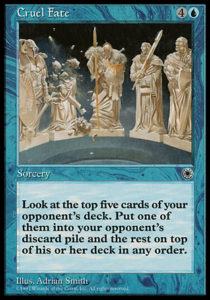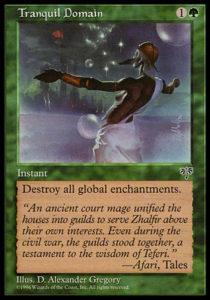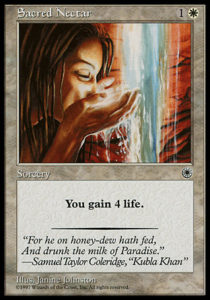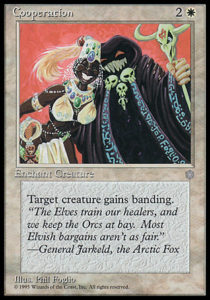I’m fresh home from GP Toronto (honestly – at the time of writing I’ve only been back Stateside for two hours) and I’ve got news! First of all, huge congratulations to Matt Jones and Rob Kofsky for making day two, as well as to my travel partner, Will (former Magic champion of Georgia), who picked up Magic cards for the first time in eight years and piloted UW heroic to the win-and-in (losing to an Ashen Rider exiling his Thassa, God of the Sea the turn he was going to win).
As for me, well, I died in round eight (a round I’ve never survived). I lost every die roll (but one), I mulliganed every game (but four), and I drew Felhide Minotaur or Fade into Antiquity (the two worst cards in my maindeck) almost every game. The tournament was long (at two byes, I didn’t start playing until 3:00 and didn’t stop until midnight), lonely (fewer of my friends were at this event than any other), and reeked of weed (seriously, it was omnipresent). Yet I also consider it the best tournament experience I’ve ever had. Wait, what?
How to Lose at Magic
Know your needs. Tournaments are mentally exhausting and a drain on the body. I know that I need to listen to music, be outside, and vary between being alone and relaxing with friends in order to keep my calm (or blow off steam). Tournaments have limited dining options and erratic schedules , so I know that I need to bring plenty of food and water and take bathroom breaks between every round. My body will be taxed by all the mental exertion and generally unhealthy food, so I know to bring Advil, Tums, and Chapstick. Toronto was the first GP where I felt fully prepared, both in what to expect and what I’d need.
The next time that you’ll be doing a trip (of any kind), ask yourself: What do I expect will exhaust me? What will I need to do or have to do to manage that exhaustion?
Friends are amazing! Even though you have to build a sealed pool by yourself, friends can provide constructive and friendly critiques or suggest sideboard plans or alternate decks to board into. If you’re more of the Constructed persuasion, friends provide testing partners and can let you know what to expect to play.
While I was waiting for my first round (it was about five hours), I had my friends to chill and test with. They made me feel great about my build and I did my best to do the same for them (in fact, Carrie and I are hoping to team up for an article on this very topic). There’s nothing like starting a tournament knowing that your friends have got your back – no matter how bad your beats, there’ll be someone to cheer you up.
Who do you travel with? Do you get along? Do you enjoy their company?  Lesson #3: Variance
Lesson #3: Variance
As much as Magic is a game of skill, preparation, and analysis, it’s also a game of luck. You can skew the odds in your favor with deck construction, but sometimes you’ll run badly and it won’t be your fault. You can play a deck with thirty lands and still draw a seven card hand with none, then mulligan all the way down to zero and never find a land—highly unlikely, sure, but it can and will happen.
Consider the average day one of a Limited Grand Prix. There are between one and two thousand people, spanning nine rounds. Someone will get a sealed pool with six Thassa’s Bounty or a pool with no more than six creatures in any color. Every round, someone will have to mulligan to five each game. Every round, someone will keep a two lander and never see a third land or keep a four lander and draw zero spells. Sometimes, victory just isn’t in the cards—sure, plenty of pros consistently make day two, but you don’t hear about the pros who mulligan to four, go 0-2 drop, and play in the Sunday Super Series.
I had a nice chat with Mark Lovin (great guy!) on day two. He was undefeated on day one—he acknowledged that he drew the cards he needed when he needed them, had a good balance of lands and spells, and rarely had to mulligan. On day two, the opposite was true and accrued losses. I don’t deny his skill at the game—he wouldn’t have been undefeated if he weren’t a great player in addition to running well—but he acknowledged that part of his success was due to his running well.
I’m not going to complain about the quality of my sealed pool (I was pretty satisfied with it) or the frequency of my mulligans (which I think were the right calls each time—usually they were obvious mulls like seven/zero lands or six/one lands that didn’t do anything). I ended day one feeling that I’d built the best deck that I could, kept the hands that I could, and played to the best of my ability. It may be cocky, but I feel that if only I were a bit luckier, I’d have made day two. I felt great because, for the first time, it felt like I did everything that I had control over right.
Sometimes you can do everything right and it’ll still go wrong. Sometimes you make mistakes to learn from. Sometimes you don’t err and should be proud of going as far as you do with the hand you’re dealt.  Lesson#4: Attitude
Lesson#4: Attitude
This was the first GP where I wasn’t completely miserable by round eight (where I’m normally, hungry, cranky, and exhausted—but I prepped for that!). I’m a social Timmy, and my favorite thing about Magic (more than the intellectual challenge or competition) is meeting new people. I’m pleased to say that I liked each and every one of my opponents (a first for me at a GP).
I didn’t take it personally when I lose (let’s be honest—your opponent isn’t a villain for beating you just like you’re not a villain for beating anyone, and it sucks when you win a game of Magic and your opponent looks like a parent just died). I did my best to keep my own spirits up and hell, my opponents’ as well. I enjoyed getting to get to know someone new each round. I was happy to share some gum, some stories, or some Advil with anyone who needed ’em. I tried to keep my spirits up, and in so doing, I may have helped bring up my opponents’ spirits as well, and that let us both have more fun.
Now, I’m not telling you that you need to act like me (friendly, likely obnoxiously so). You don’t owe your opponents anything (more than basic human courtesy—for the love of Batman, shower! Brush your teeth! Don’t be an ass!). However, Magic is a social game played against people with feelings, minds, and histories. I believe that if you’re denying yourself human interaction, you’re denying yourself a coping mechanism for the stresses of the tournament, as well as fun.
Don’t lose sight of what matters to you. Remember that winning isn’t everything and that opponents are people, too.
Well, that about wraps everything up. I’ve been super busy lately but I’ve got a whole bunch of ideas and projects coming off the back burner. Looking forward to sharing them all with you!
—Zachary Barash
twitch.tv/ZennithGP — Join the livestream!
Magic Online username: Zennith
Zachary Barash has been playing Magic on and off since 1994. He loves Limited and drafts every available format (including several that aren’t entirely meant to be drafted). He’s a proud Cube owner and performer, improvising entire musicals every week with his team, Petting Zoo. Zach has an obsession with Indian food that borders on being unhealthy.



